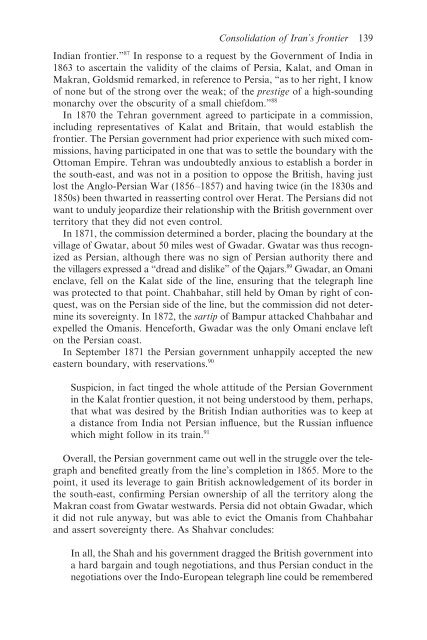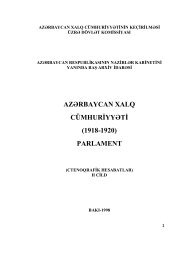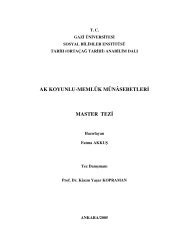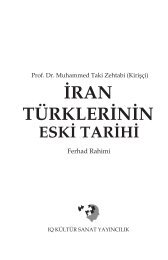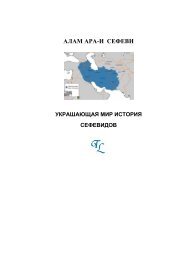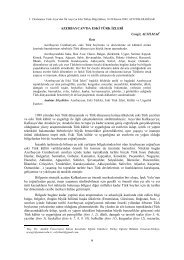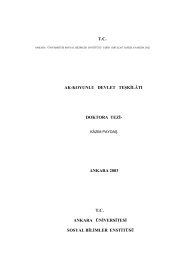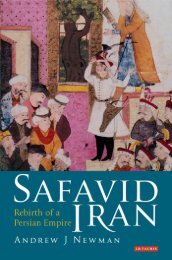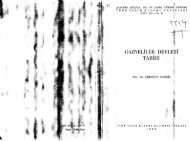War and Peace in Qajar Persia: Implications Past and ... - Oguzlar.az
War and Peace in Qajar Persia: Implications Past and ... - Oguzlar.az
War and Peace in Qajar Persia: Implications Past and ... - Oguzlar.az
- No tags were found...
Create successful ePaper yourself
Turn your PDF publications into a flip-book with our unique Google optimized e-Paper software.
Consolidation of Iran’s frontier 139Indian frontier.” 87 In response to a request by the Government of India <strong>in</strong>1863 to ascerta<strong>in</strong> the validity of the claims of <strong>Persia</strong>, Kalat, <strong>and</strong> Oman <strong>in</strong>Makran, Goldsmid remarked, <strong>in</strong> reference to <strong>Persia</strong>, “as to her right, I knowof none but of the strong over the weak; of the prestige of a high-sound<strong>in</strong>gmonarchy over the obscurity of a small chiefdom.” 88In 1870 the Tehran government agreed to participate <strong>in</strong> a commission,<strong>in</strong>clud<strong>in</strong>g representatives of Kalat <strong>and</strong> Brita<strong>in</strong>, that would establish thefrontier. The <strong>Persia</strong>n government had prior experience with such mixed commissions,hav<strong>in</strong>g participated <strong>in</strong> one that was to settle the boundary with theOttoman Empire. Tehran was undoubtedly anxious to establish a border <strong>in</strong>the south-east, <strong>and</strong> was not <strong>in</strong> a position to oppose the British, hav<strong>in</strong>g justlost the Anglo-<strong>Persia</strong>n <strong>War</strong> (1856–1857) <strong>and</strong> hav<strong>in</strong>g twice (<strong>in</strong> the 1830s <strong>and</strong>1850s) been thwarted <strong>in</strong> reassert<strong>in</strong>g control over Herat. The <strong>Persia</strong>ns did notwant to unduly jeopardize their relationship with the British government overterritory that they did not even control.In 1871, the commission determ<strong>in</strong>ed a border, plac<strong>in</strong>g the boundary at thevillage of Gwatar, about 50 miles west of Gwadar. Gwatar was thus recognizedas <strong>Persia</strong>n, although there was no sign of <strong>Persia</strong>n authority there <strong>and</strong>the villagers expressed a “dread <strong>and</strong> dislike” of the <strong>Qajar</strong>s. 89 Gwadar, an Omanienclave, fell on the Kalat side of the l<strong>in</strong>e, ensur<strong>in</strong>g that the telegraph l<strong>in</strong>ewas protected to that po<strong>in</strong>t. Chahbahar, still held by Oman by right of conquest,was on the <strong>Persia</strong>n side of the l<strong>in</strong>e, but the commission did not determ<strong>in</strong>eits sovereignty. In 1872, the sartip of Bampur attacked Chahbahar <strong>and</strong>expelled the Omanis. Henceforth, Gwadar was the only Omani enclave lefton the <strong>Persia</strong>n coast.In September 1871 the <strong>Persia</strong>n government unhappily accepted the neweastern boundary, with reservations. 90Suspicion, <strong>in</strong> fact t<strong>in</strong>ged the whole attitude of the <strong>Persia</strong>n Government<strong>in</strong> the Kalat frontier question, it not be<strong>in</strong>g understood by them, perhaps,that what was desired by the British Indian authorities was to keep ata distance from India not <strong>Persia</strong>n <strong>in</strong>fluence, but the Russian <strong>in</strong>fluencewhich might follow <strong>in</strong> its tra<strong>in</strong>. 91Overall, the <strong>Persia</strong>n government came out well <strong>in</strong> the struggle over the telegraph<strong>and</strong> benefited greatly from the l<strong>in</strong>e’s completion <strong>in</strong> 1865. More to thepo<strong>in</strong>t, it used its leverage to ga<strong>in</strong> British acknowledgement of its border <strong>in</strong>the south-east, confirm<strong>in</strong>g <strong>Persia</strong>n ownership of all the territory along theMakran coast from Gwatar westwards. <strong>Persia</strong> did not obta<strong>in</strong> Gwadar, whichit did not rule anyway, but was able to evict the Omanis from Chahbahar<strong>and</strong> assert sovereignty there. As Shahvar concludes:In all, the Shah <strong>and</strong> his government dragged the British government <strong>in</strong>toa hard barga<strong>in</strong> <strong>and</strong> tough negotiations, <strong>and</strong> thus <strong>Persia</strong>n conduct <strong>in</strong> thenegotiations over the Indo-European telegraph l<strong>in</strong>e could be remembered


